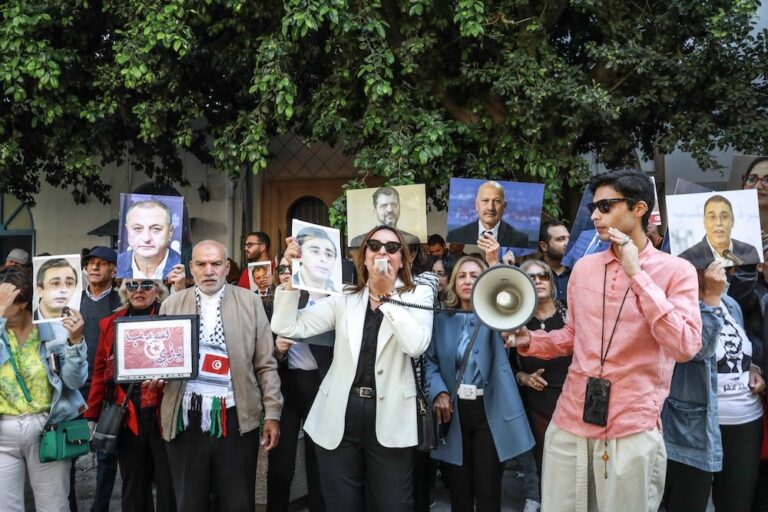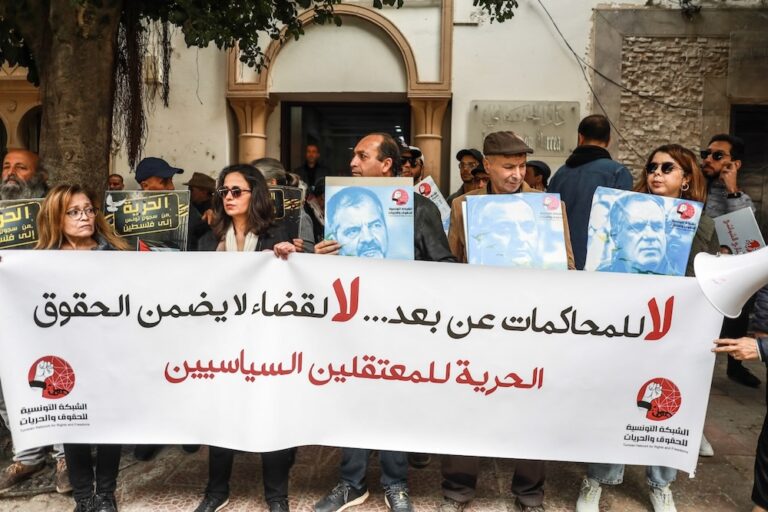The IFEX-TMG, a coalition of 20 IFEX members, condemns the Tunisian Chamber of Deputies' adoption of a new law hastily tailored to stifle freedom of expression both inside and outside the country.
(IFEX-TMG) – 18 June 2010 – The International Freedom of Expression Exchange Tunisia Monitoring Group (IFEX-TMG), a coalition of 20 IFEX members, condemns the adoption by the Tunisian Chamber of Deputies on Tuesday of a new law hastily tailored to stifle freedom of expression both inside and outside Tunisia and to threaten government critics with heavy jail sentences.
The new legislation amends Article 61a of the penal code, which currently imposes jail sentences from five to 12 years for contacting “agents of a foreign power to undermine the military or diplomatic situation in Tunisia.” The amendment stipulates that any Tunisian who establishes “contacts with agents of a foreign power or a foreign organisation” to harm “Tunisia’s vital interests” and its “economic security” will be sanctioned, reported the official news agency TAP on Tuesday.
However, IFEX-TMG members are concerned that this law, as drafted, will stifle legitimate political and social protest. Any restrictions on freedom of expression should not be vaguely drafted and should be proportionate to the legitimate aim pursued – protecting national security.
Local and international human rights groups expressed their deep concern in May when the Tunisian cabinet headed by President Zine El Abidine Ben Ali announced the draft law. It appeared to be created in reaction to calls by Tunisian human rights defenders for the European Union (EU) to tie Tunisia’s promotion to an “advanced status” with the EU to the improvement of its alarming human rights record.
Article 2 of the 1995 association agreement between Tunisia and the EU stipulates that respect for democratic principles and fundamental rights guide the two parties’ domestic and international policies.
“The Tunisian parliament would pass any draft law presented by the government; whatever problems it would create for the country and the people. The legislative branch is a tool to serve the President’s interests and silence his critics,” said Mokhtar Yahyaoui, a former judge constantly harassed since he sent a letter in 2001 to President Ben Ali to urge him to protect the independence of the judiciary.
The adoption of the new legislation occurred amid a smear media campaign orchestrated by the government against vocal human rights defenders who recently met with European Union officials. The Tunisian human rights defenders solely called on their European interlocutors to remind their Tunisian partners of the urgent need to abide by their human rights obligations, particularly the International Covenant on Civil and Political Rights and the Association agreement with the European Union.
“We are increasingly concerned about the intensifying war on freedom of expression and the safety of Tunisian human rights defenders and critical journalists after the adoption of this shameful law,” said IFEX-TMG Chair Rohan Jayasekera of Index on Censorship. “The time has come for the friends and partners of the Tunisian government in the European Union and elsewhere to intercede to end the use of the legislative and judicial branches to stifle freedom of expression and punish democracy advocates.”
On 6 June 2010 in Beirut, Lebanon, IFEX-TMG members launched a report on the fact-finding mission to Tunisia (25 April – 6 May 2010) titled “Behind the Façade: How a Politicised Judiciary and Administrative Sanctions Undermine Human Rights.”


